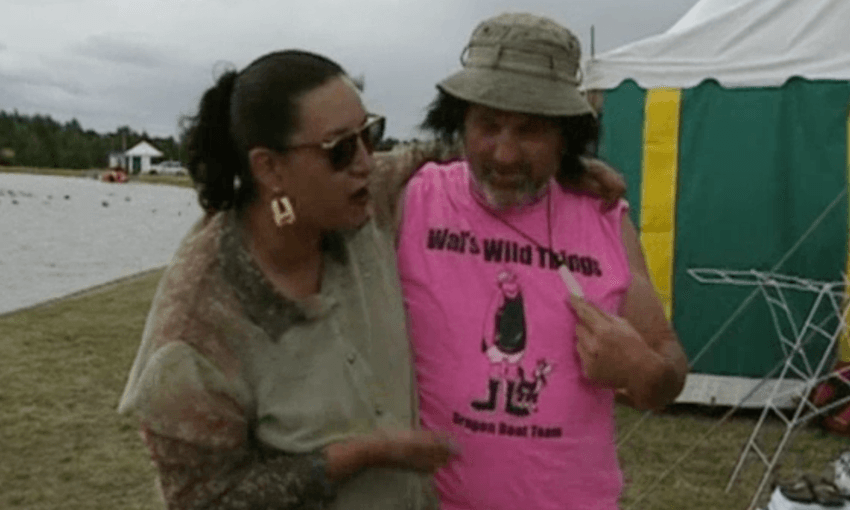Alex Casey rewatches Georgie Girl, the 2001 documentary about how Georgina Beyer conquered ‘redneck’ smalltown Aotearoa.
There’s that Mr Rogers quote that does the rounds on social media whenever anything bad happens: “when I was a boy and I would see scary things in the news, my mother would say to me, ‘Look for the helpers. You will always find people who are helping’.” While it’s a sentiment that sadly seems to pop up more and more with every passing day, it remains a useful reminder to turn away from the horrors of humanity and focus on the good things.
In the instance of the Destiny Church protestors storming a pride event at the Te Atatū library over the weekend, allegedly assaulting one teenager and forcing parents and children to barricade themselves in, there are plenty of places you can look for the helpers. There’s the many events still to come in the Pride festival, ways to support artists directly, and plenty of things you can watch to flush out the poisonous images from your brain.
Some, for example, have been sharing the clip of the late Georgina Beyer, the world’s first transgender MP, confronting Destiny Church members during the Civil Union Bill in 2004. “Why do you hate people like us so much?” she says, walking along the barricade. “Your hatred is totally intolerable. How dare you use the cloak of christianity when you are imparting to your children prejudice and discrimination towards people like me?”
>If you like Beyer spitting truths in the face of bigotry, I can also highly recommend rewatching Georgie Girl, the 2001 documentary made by Peter Wells and Annie Goldson which is available in full on NZ On Screen. Following her journey from trans sex worker in the city to elected MP in the traditionally-conservative regions, the documentary captures a version of Aotearoa at its best – empathetic, warm, welcoming and frequently really fucking funny.
“Anybody new arriving in town… you tended to hear about it,” one local says, wryly reflecting on the arrival of a Māori sex worker, drag performer and trans woman arriving into the largely white and conservative electorate in the mid 90s. “It was quite a new ballgame for Carterton people.”
Another local, Chris Burt, sums up said ballgame well: “a former prostitute arrives in town and three years later she is the mayor. It just doesn’t happen really, does it? But it did.” Perched on a velvet sofa, she later chuckles recalling her teenage son being “perturbed” that he might have to socialise with Beyer. “It was a good education for him,” she grins. “He soon got over it – within a few hours he realised that she was just a normal human being.”
The documentary not only speaks to a bunch of open-hearted and crackup locals in a town acknowledged by some as “crusty” and “redneck”, but follows Beyer as she attends a range of community events as mayor. After recent scenes of tension and violence, you may bristle at the sight of a Māori trans woman walking into a crowd of burly men wearing singlets and stubbies, but there is absolutely nothing to fear here.
At the regional dragon boating competition in Masterton, Beyer is embraced in a bear hug by the leader of Wal’s Wild Things, assumedly named Wal, who is dressed up as Fred Dagg. “We’re the rough ones,” he beams, before he and Beyer sing a rousing rendition of the “everywhere we go-o, people want to kno-ow” chant. The pair standing arm-in-arm is a beautiful image to behold, nearly 25 years on.
That’s not to say that it is all scarecrows and daffodils (two of Carterton’s most famous things). There’s the endless media scrutiny about Beyer’s surgery and sex life, and some pretty horrid comments from National candidate Paul Henry, her political opponent at the time. “You’ve just said Georgina is a serious person,” he sternly tells an interviewer. “But she’s a transexual – do those things necessarily go together?” Banished!
The locals don’t have time for this kind of carry-on. “I can think of one or two people who were very prejudiced against her, but it would have been a minority,” an old fella murmurs into his beer at the RSA. We leave Beyer musing on her place in Aotearoa, with prescient words for the decades to follow. “A lot of what I have done has been about carrying on from those who have gone before me, to help to fulfill a greater place on this earth for us.”
“What for? To be equal to everybody else.”

